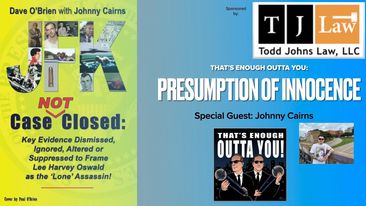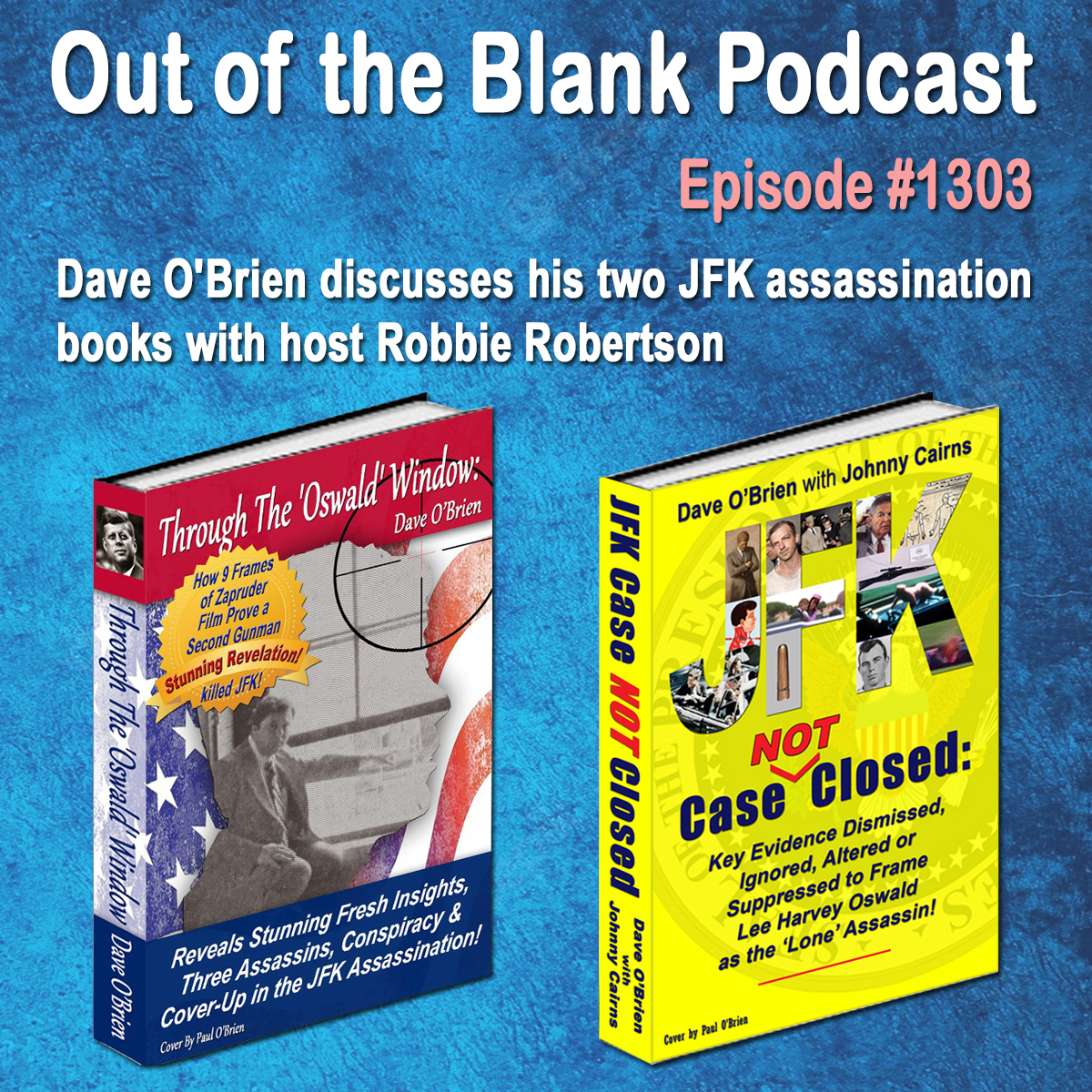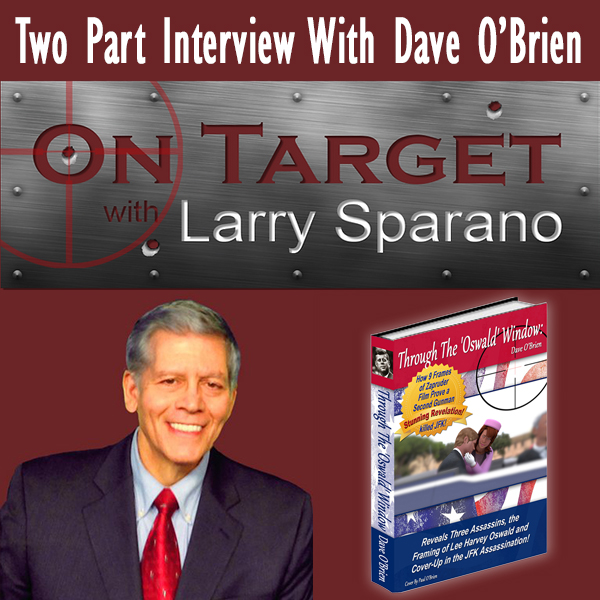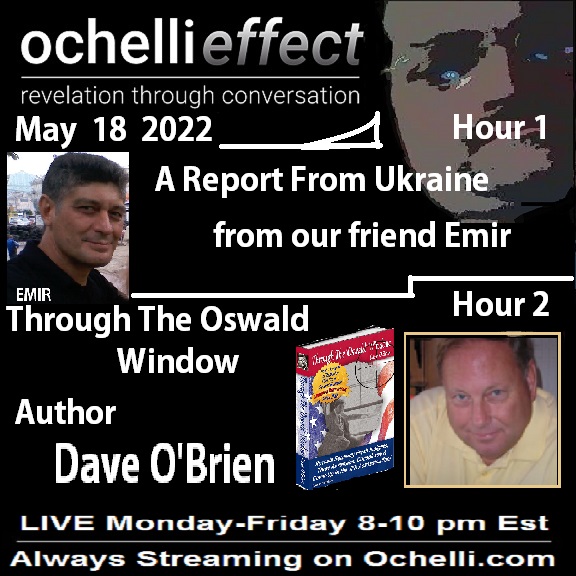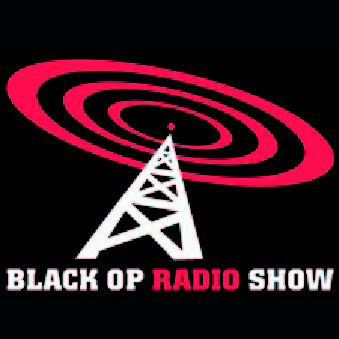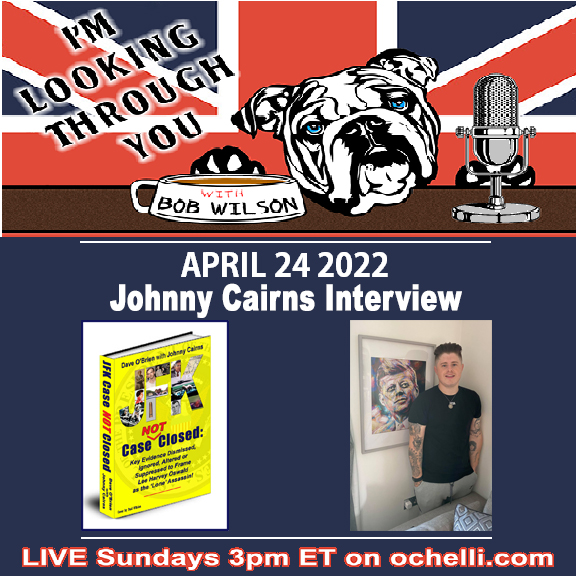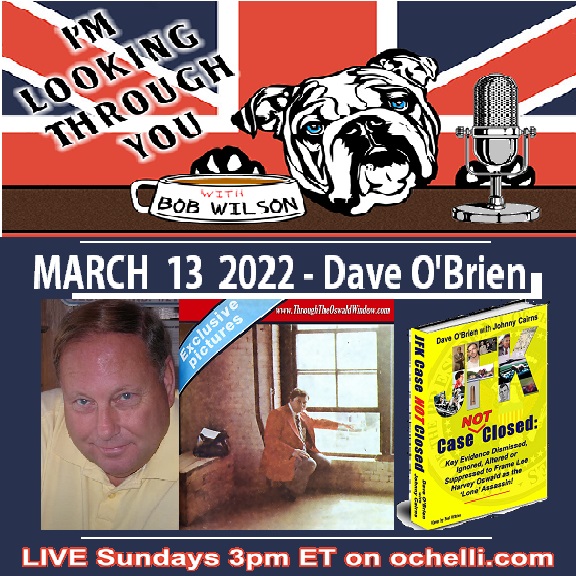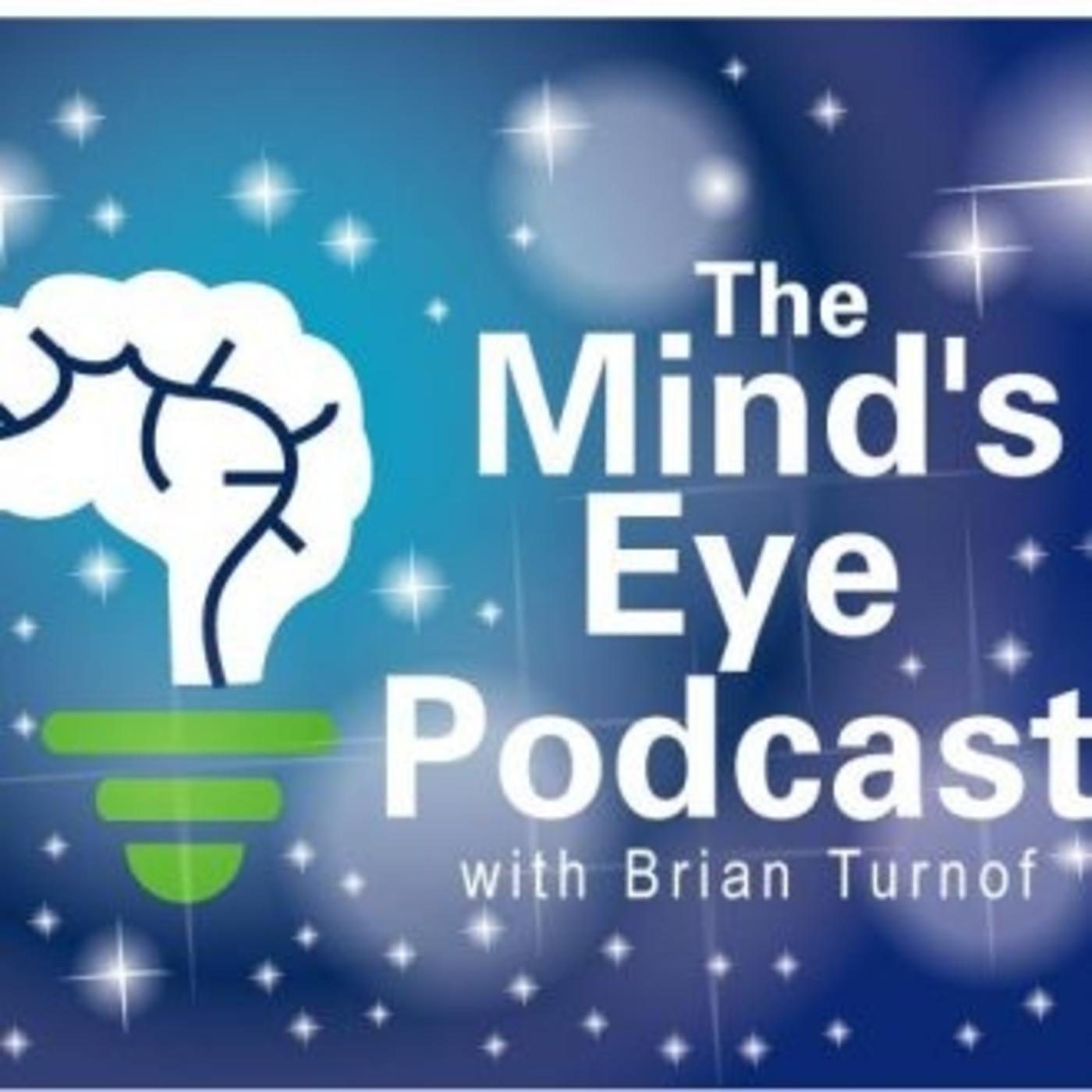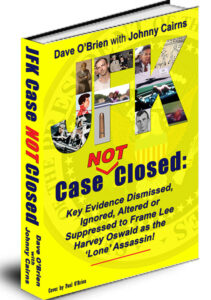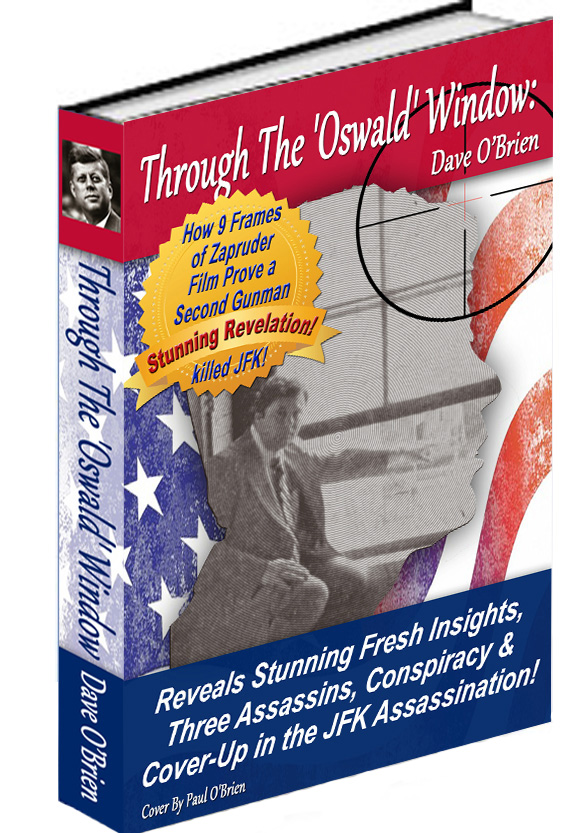The RFK Assassination 50th Anniversary – How the Two Kennedy Assassinations Are Linked and Why Bobby Could Not be Allowed to Win the Presidency in 1968
by Dave O’Brien
On this, the 50th anniversary of the RFK assassination, a sorrowful reality makes his death doubly tragic.
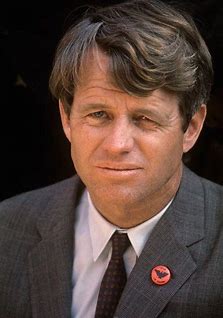
For people who seek the Presidency, it is often the pursuit of a life-long dream.
For Robert Francis Kennedy, it was the pursuit of a five-year nightmare!
During those five anguished years, Bobby Kennedy didn’t just live in horrid grief over his brother being assassinated in a Presidential motorcade in Dallas.
Since that tragic November day in 1963, Bobby had lived a tortured life, haunted by the fear that he may have directly caused his brother John to be murdered.
Robert Kennedy had served his brother as Attorney General of the United States, forming a special division within the Justice Department to go after organized crime.
It was enacted with President Kennedy’s blessing. In the late 1950’s, the two brothers served on the Senate Select Committee on Improper Activities in Labor and Management.
During those hearings, Chief Council Robert Kennedy and several top members of organized crime and labor developed a hatred for each other, which Kennedy brought with him into the Justice Department.
THE MAKING OF ENEMIES
There are recorded confrontational exchanges at those hearings between Bob Kennedy and Teamsters Union chief Jimmy Hoffa, as well as Chicago’s top mob boss Sam Giancana, Florida’s mafia chieftain Santo Trafficante and Carlos Marcello, head of the Louisiana and Texas crime families.
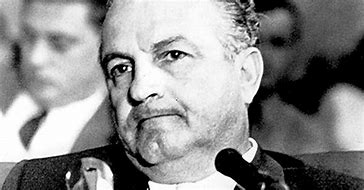
The Senate hearings were largely stymied by an uncooperative strategy by the heads of organized crime. They all declined to answer any questions of substance, citing their right to assert the Fifth Amendment because an honest answer might tend to incriminate them.
All four high profile crime leaders later became prime targets of Kennedy’s mob squad during the shortened JFK presidency.
Despite the clash between Bobby Kennedy and Giancana during the Senate hearings, the Chicago mafia chieftain entered into an agreement with Kennedy patriarch Joseph Kennedy in 1960 to help JFK win the state of Illinois that narrowly delivered the White House to the Kennedy clan instead of Richard Nixon.
So, when RFK’s Justice Department made Giancana a prime target once the Kennedy’s were in office, he felt betrayed.
While Robert Kennedy was Attorney General, Hoffa and Giancana were pursued relentlessly by the special band of mob busters.
America’s other top organized crime bosses of that time soon felt the wrath of the Justice Department, such as Marcello, Trafficante and Meyer ‘The Accountant’ Lansky.
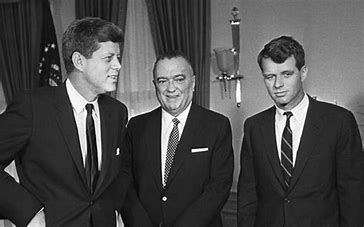
Along with Charles ‘Lucky’ Luciano, Lansky helped to nationalize an organized crime commission that amalgamated hundreds of regional mob units across the country into a more corporate structure under the umbrella of ‘The Commission.’
WHAT ORGANIZED CRIME?
Prior to the Kennedys winning the White House, La Cosa Nostra was well down the list of priorities at the Justice Department because J. Edgar Hoover didn’t believe that a syndicate of crime existed. As a result, he refused to assign his FBI agents to this growing brand of lawlessness.
Despite Hoover’s protests, that all changed when Jack won the Presidency and made brother Bobby Attorney General, becoming Hoover’s direct boss. Hoover was used to commanding the ear of the President whenever he wished, but no more.
The result? Between 1961 and 1964, the conviction rate of organized crime figures rose 800%.
The Attorney General did not shy away from his public feuds with Jimmy Hoffa or mafia kingpins like Carlos Marcello. Kennedy went so far as to deport Marcello to Guatemala without due process of the law. Months later, Marcello snuck back into the U.S.
Marcello’s disdain for the Kennedys lasted well after both brothers had met the same violent death. While serving time in jail for his part in attempting to bribe state officials in an insurance scheme, Marcello ran his mafia empire from his prison cell.
He befriended his cellmate Jack Van Laningham, a planted undercover FBI informant who recorded several months of dialogue with Marcello. In 1985, a surveillance tape captured Marcello taking credit for the crime of the century:
“Yeah, I had the son-of-a-bitch killed. I’m glad I did.
I’m sorry I couldn’t have done it myself!”
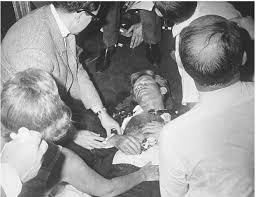
In 1978, the HSCA heard sworn testimony from Hoffa teamster Edward Becker who said he was present at a meeting at which Marcello explained why he went after JFK instead of his hated nemesis Bobby Kennedy:
“If you want to kill a dog, you don’t cut off its tail. You cut off its head. The dog (President Kennedy)
will keep biting you if you only cut off the tail (Bobby). But if you cut off the head, the dog will die, tail and all.”
REVENGE ON THE KENNEDYS?
When Jack Ruby gunned down Lee Harvey Oswald two days after President Kennedy was assassinated, the Warren Commission took the place of a public trial.
The Commission concluded that Oswald acted alone and that his killer, Jack Ruby, also acted independently.
We cannot say for certain if Marcello’s remarks were a true confession or merely bombastic musings from long-held wishful thinking.
Regardless, it became apparent that a brotherhood of mob bosses shared an immense dislike of the Kennedy boys.
Florida’s Santo Trafficante loathed the Kennedy’s because of the administration’s failure to oust Fidel Castro and reinstate deposed dictator Fulgencio Batista.
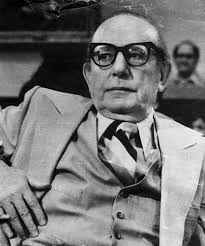
Trafficante worked hand-in-hand with Marcello in helping anti-Castro rebels prepare for the CIA planned Bay of Pigs invasion in 1961. After that failed, the CIA recruited mobsters to help with a different strategy.
This unholy alliance, formed without Robert Kennedy’s knowledge or approval, both had a common goal – the removal or assassination of Castro.
The CIA was troubled by the island ruler’s anti-American rhetoric and his leaning toward Communism as the country’s political ideology.
Organized crime, Trafficante and Lansky in particular, was allowed to operate all casino’s in Havana, raking in millions of dollars a year. When Castro took over, he not only nationalized the casinos, he deported Lansky and imprisoned Trafficante for months.
The win-win arrangement fell apart when JFK orchestrated a peaceful solution to the Cuban Missile Crises in 1962 and promised to honor Cuba’s sovereign rights under Castro’s regime.
Some conspiracy theorists believe, as proposed in this reporter’s book Through The ‘Oswald’ Window, that it was this historic event that caused the target to switch from the Cuban dictator to the American President.
SO MANY ENEMIES!
To Bobby Kennedy, this would be the most horrific of the possible scenarios because he would have to accept much of the blame for his brother’s public execution.
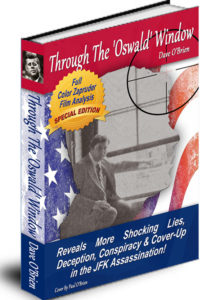 So, knowing that he could not serve the detested Lyndon Johnson as his Attorney General, RFK used his limited time and resources at the Department of Justice to do what he believed the Warren Commission failed to do – ascertain the truth about why and how John F. Kennedy died on November 22, 1963.
So, knowing that he could not serve the detested Lyndon Johnson as his Attorney General, RFK used his limited time and resources at the Department of Justice to do what he believed the Warren Commission failed to do – ascertain the truth about why and how John F. Kennedy died on November 22, 1963.
His easiest option would have been to accept the historical record that Lee Harvey Oswald acted as a lone nut, but he couldn’t do it because he didn’t believe it.
While the outgoing Attorney General most feared a mafia ‘hit’ on his brother, his limited personal investigation sought out a lesser evil as being responsible.
Kennedy insiders doubt that Bobby’s ‘anyone but the mafia’ search for answers would have eased his heartache significantly. RFK had become a de facto co-President to his brother.
Any enemies the brief administration created was as much the doing of Bobby as Jack.
And the list of enemies the Kennedy brothers made beyond organized crime is alarming, such as:
• The Teamsters – Jimmy Hoffa’s hatred of Bob Kennedy is legendary, but it was also deeply personal.
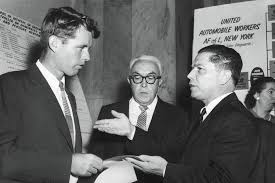
As it relates to JFK’s killing, the consensus is that Hoffa despised RFK so much, his singular focus would have been to get rid of the younger Kennedy.
Since Hoffa had financial ties to organized crime, it’s doubtful that he would have went after JFK or Bobby on his own because his mafia associates would have immediately become a prime suspect.
After JFK’s assassination in Dallas, a jubilant Hoffa was heard to say, “Bobby is just a lawyer now.”
• KKK – The Kennedys came to embrace the plight of the country’s African Americans and moved toward civil rights legislation to abolish segregated schools, restaurants, public washrooms and voting restrictions.
The obvious objectors were the Ku Klux Klan, infamous in the southern states for its militancy against negroes.
When the Kennedys used justice department resources and national guardsmen to ensure the safety of Martin Luther King Jr.’s public demonstrations, Klansmen often countered with public taunts and threats to negroes seeking integration.
As the 1964 election loomed, the Kennedys worked toward civil rights legislation in opposition to everything the KKK stood for.
• Ultra Right-Wing Extremists – Another powerful militant voice in the south were ultra conservative groups like the John Birch Society.
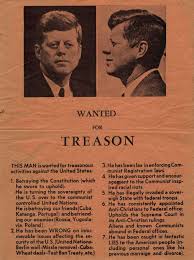
These groups publicly branded the JFK presidency as soft on Communism and thought the youthful President was no match for the threatening antics of Khrushchev.
Retired Texas extremist General Edwin A. Walker loudly called for the U.S. to bomb Cuba into oblivion after Castro declared his political affiliation with the Soviet Union.
Interestingly, just seven months before JFK made his fateful trip to Dallas, Walker was himself the target of assassination by the man who would be named as the ‘lone’ assassin of President Kennedy. Walker was unhurt in the attempt.
• Big Oil – Rich oil tycoons in the southern states came to see JFK as a threat to their empires.
Prior to Kennedy taking the oath of office, oil barons like the Hunts and the Murchison empire received lucrative tax breaks. They were seen as industrial saviors by providing Americans with an essential resource, so they were allowed to keep 27.5% of their earnings tax free.
In 1963, JFK proposed eliminating the oil depletion allowance , which would have cost Texas oilmen $300 million annually. After his death, Texan Lyndon Johnson scraped the plan.
Rumors persist that Hunt and his fellow oil barons produced this advertisement protesting JFK and LBJ’s visit to Texas.
• LBJ – One of the most enduring conspiracy theories is that Lyndon Baines Johnson had JFK killed so he could become President.
LBJ shared a reciprocal dislike with the Kennedy brothers at a time when rumors circulated that Johnson would be dropped from the Democratic ticket in 1964.
What we do know is that LBJ took the oath of office 128 minutes after his predecessor was murdered in his home state.
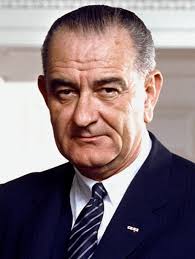
Once accused assassin Lee Harvey Oswald was shot dead, Johnson quickly formed the Warren Commission and gave birth to endless conspiracy theories when he classified thousands of documents as “Top Secret” in the interests of national security.
Many believe that President Johnson is directly responsible for the cover-up that endures to this day because he locked those files away for 75 years under Presidential seal.
This would emerge as critical in Robert Kennedy’s decision to seek the presidency in 1968.
The one question that undoubtedly troubled RFK, as it still does to JFK assassination researchers, is:
What is the risk to national security if
Lee Harvey Oswald was a ‘lone’ nut assassin?
If Johnson was not behind the killing of President Kennedy, he certainly set the cover-up in motion.
• J. Edgar Hoover – The notion that Jack and Bobby were planning to force Hoover into retirement to start their second term in office is nonsensical.
The long-standing FBI director, who had files on the darkest and deepest secrets of all Washington politicians, felt quite secure in his job with the Kennedys.
Why wouldn’t he? He had files on Jack and Bobby’s unholy extra-marital affairs.
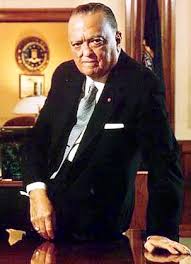
In particular, JFK understood that with the ease of a unanimous leaked tip, the media would learn of the President’s fling with Hollywood siren Marilyn Munroe.
Even worse, Hoover knew that JFK had an affair with a German spy, as well as Judith Campbell Exner, who was also the mistress of Chicago crime boss Sam Giancana.
Like LBJ, Hoover likely had no direct involvement with the JFK assassination, but he was an integral part of the cover-up.
Hoover’s FBI was the chief investigative arm of the Warren Commission, which meant that upwards of 90% of all information provided to the panel first had to be approved by Hoover.
Less than 24 hours after President Kennedy had been killed, Hoover wrote an internal memo that labelled Oswald as the solitary killer. His field agents knew to not let facts get in the way of what the Director wanted.
• Military/Intelligence Complex – There was no shortage of inside adversaries during JFK’s presidency. Mere months into the administration, JFK and RFK clashed with the military – intelligence complex.
In addition to Hoover, the Commander-in-Chief fought the radical influence of his military brass.
He was most at odds with hawkish Air Force General Curtis LeMay, who had 1500 nuclear weapons under his command and was not hesitant to use them.
LeMay and Kennedy had several disagreements over how the U.S. should deal with their cold war nemesis. LeMay wanted to bomb Cuba “back to the stone age” even though hundreds of Soviet troops were on the island.
The young President stood up to his militant Generals and opted for a naval blockade off the shores of Cuba to give Khrushchev one last chance to back down with dignity.
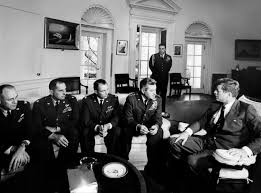
Much to the chagrin of LeMay and the military joint chiefs, the ploy resulted in a peaceful resolve. Kennedy’s popularity soared to near historic highs.
Just five months before his death, JFK and his military chiefs battled over Kennedy’s policy of détente with the Soviets.
Again, JFK disregarded the advice of his military leaders and signed the 1963 Nuclear Test Ban Treaty. LeMay was heard to say that America just got played because “the communists will never live up to the terms of the agreement.”
To the very end, JFK fought with his Generals and some of his national security advisers. The last battle they waged pertained to Vietnam.
His military wanted to escalate the war while the Kennedy brothers leaned toward a gradual reduction of military ‘advisors’ in Vietnam.
When Kennedy was gunned down, less than 122 U.S. soldiers had died in the conflict. LBJ sided with his military, which eventually resulted in 58,168 American lives lost.
Despite having a motive to get Kennedy out of office, there is no proof that the JFK assassination was a military coup d’etat.
Starting with the Bay of Pigs fiasco, Kennedy’s late decision to pull back military air cover for the invading anti-Castro freedom fighters also irked the CIA hierarchy. It was the CIA who trained the anti-Castro rebels.
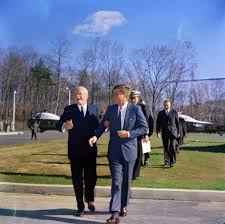
JFK believed he was misinformed by CIA intelligence about the attack. As a result, he fired CIA Director Allen Dulles and Assistant Director Richard Bissell.
Kennedy accepted blame for the Bay of Pigs failure, but let it be known he wanted to “Shatter the CIA into a thousand pieces and scatter it to the winds.”
When LBJ assembled the Warren Commission, he called upon Dulles to be one of the seven members. He knew how to bury secrets and where to hide them.
Like Hoover’s censure of FBI files, Dulles got to approve all CIA documents made available to the Commission and suppress the files that might cast a bad light on the agency.
How agonizing it must have been for Robert Kennedy to realize just how many enemies he and his brother had made in the White House.
While none of the possibilities listed here would have rid RFK of the guilt he carried over his brother’s assassination, the prospect of organized crime being the culprit drove him into deep depression.
It is the one scenario, above all others, that made him feel directly responsible for his brother’s horrible death.
“I SEEK THE PRESIDENCY…”
Robert Francis Kennedy sought the presidency in 1968 as an anti-war candidate and to “propose new policies.”
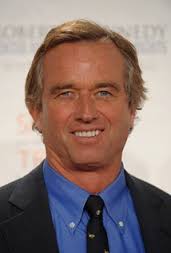
But was there also a deeply personal and haunting reason for Kennedy to run?
Bobby was too heartbroken to read the Warren Report, so he had some of his trusted aids read the summary edition and give him feedback on the likelihood of Oswald being guilty or innocent as a ‘lone’ assassin.
The consensus delivered a stark reality to Bobby – The only way to secure the truth was to become President of the United States.
Only as President could Kennedy get access to the files that LBJ locked away under Presidential seal.
As the toughest of the Kennedys, Bobby risked everything to discover the truth, no matter how painful it might prove to be.
NOT PLEASED
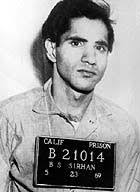
No doubt, certain individuals inside the list of adversaries listed here were not happy to see RFK on the presidential campaign trail.
Further, we must consider that if any of these entities orchestrated JFK’s assassination, they likely felt threatened by another Kennedy in the White House.
To that end, we must ponder this frightening possibility:
Robert Francis Kennedy Could NOT Be Allowed to Become President!
On June 5, 1968, RFK seemed well on his way to the oval office. Amid a wild celebration of the California primary victory, Sirhan Sirhan made us suffer the unthinkable once again.
And not surprising, history records that another Kennedy was assassinated by another ‘lone’ nut.
50 years later, the RFK assassination still haunts us for what happened and for what could have been.
